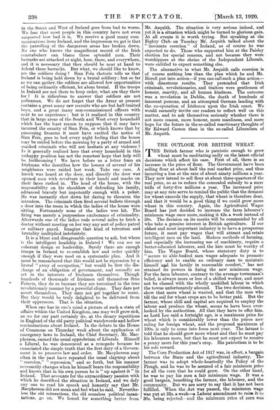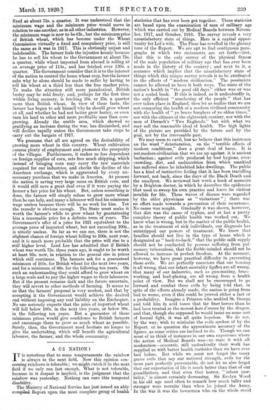THE OUTLOOK FOR BRITISH WHEAT. T HE British farmer who is
patriotic enough to grow wheat must be meditating sadly on the latest official decisions which affect his case. First of all, there is an increase in the price of flour. The Government have been selling flour at about half the real market price, and thus incurring a loss at the rate of about ninety millions a year. They now intend to sell flour at about three-quarters of the real price, so as to reduce the concealed subsidy to a mere trifle of forty-five millions a year. The increased price may at any rate serve to remind the public that the demand for wheat exceeds the supply, that wheat is therefore dear, and that it would be a good thing if we could grow more wheat in this country. Again, the Agricultural Wages Board has just decided to increase the farm labourer's minimum wage once more, making it 42s. a week instead of 38s. The decision on its merits will be commended by all who take a genuine interest in British agriculture. If our oldest and most important industry is to have a prosperous future, it must pay wages that will attract and retain intelligent men on the land. Modern methods of farming, and especially the increasing use of machinery, require a better-educated labourer, and the hire must be worthy of him. The Wages Board, whose statutory duty is to " secure to able-bodied men wages adequate to promote efficiency and to enable an ordinary man to maintain himself and his family in reasonable comfort," has not strained its powers in fixing the new minimum wage'. For the farm labourer, contrary to the average townsman's belief, is always-more or less of a skilled worker, and must not be classed with the wholly unskilled labour in which the towns unfortunately abound. The two decisions, then, show that more wheat is wanted, and that the men who till the soil for wheat crops are to be better paid. But the farmer, whose skill and capital are required to employ the labour and produce the wheat, seems to have been over, looked. by the authorities. All that they have to offer him, as Lord Lee said a fortnight ago, is a maximum price for wheat which is considerably lower than the prices now ruling for foreign wheat, and the proposed maximum of 100s. is only to come into force next year. The farmer is told that he should grow more wheat and that he must pay his labourers more, but that he must not expect to receive a penny more for this year's crop. His patriotism is to be his sole reward.
The Corn. Production Act of 1017 was, in effect, a hart between the State and the agricultural industry. farmer was to adopt whole-heartedly the Policy of the Plough, and he was to be assured of a fair minimum price for all the corn that he could grow. On the other hand, he was to pay his men a fair minimum wage. It was a good bargain, benefiting the farmer, the labourer, and the community. But we are sorry to say that it has not been fulfilled. When the Act was passed, the minimum wage was put at 25s. a week—a Labour amendment to raise it to 30s. -being rejected—and the minimum price of corn was fixed at about 75s. a. quarter. It was understood that the minimum wage and the minimum price would move in relationto one another, as in all other industries. However, the minimum wage is now to be 42s., but the minimum price of British wheat, which has become under the Wheat Commission virtually a fixed and compulsory price, is still the same as it was in 1917. This is obviously unjust and indefensible. The farmer feels the injustice keenly because he has to sell his wheat to the Government at about 75s. a quarter, while wheat imported from abroad is selling at an average price of 114s., and has fetched over 130s. a quarter. The Government consider that it is to the interest of the nation to control the home wheat crop, but the farmer asks why he alone should be made to suffer by having to sell his wheat at a third less than the free market price. To make the situation still more paradoxical, British barley may be sold freely, and, perhaps for the first time within living memory, is fetching 20s. or 25s. a quarter more than British wheat. In view of these facts, the farmer has begun to ask himself why he should grow wheat at all, and whether he had not better grow barley, or even turn his- land to other and more profitable uses than corn- growing. Already the arable area, which showed so gratifying an increase during the war, has diminished, and will decline rapidly unless the Government take steps to carry out the bargain of 1917.
We presume that all are agreed on the desirability of growing more wheat in this country. Wheat cultivation assures plenty of employment and promotes the prosperity of the villages. Furthermore, it makes us less dependent on foreign supplies of corn, sets free much shipping, which instead of bringing corn may carry the raw materials required for our industries, and checks the decline of the American exchange, which is aggravated by every un- necessary purchase that we make in America. At present the nation is saving very large sums on British corn, and it would still save a great deal even if it were paying the farmer a fair price for his wheat. But, unless something is done, the farmer will simply refuse to grow more wheat than he can help, and many a labourer will find his minimum wage useless because there will be no work for him. Yet the remedy is obvious enough. The State must make it worth the farmer's while to grow wheat by guaranteeing him a reasonable price for a definite term of years. The Government's offer of a price for 1921 equivalent to the average price of imported wheat, but not exceeding 100s., is utterly useless. So far as we can see, there is not the slightest chance of foreign wheat falling to 100s. next year, and it is much more probable that the price will rise to a still higher level. Lord Lee has admitted that if British wheat was worth 75s. three years ago, it ought to be worth at least 95s. now, in relation to the general rise in prices which still continues. The farmers ask for a guaranteed minimum of 100s. for British wheat for the next two years, and for a minimum of 80s. for the following ten years. On such an understanding they could afford to grow wheat on a large scale and to pay the higher wages to their labourers. But if the present remains dark and the future uncertain, they will revert to other methods of farming. It seems to us that the farmers' proposal is very modest, and that by accepting it the Government would achieve the desired end without imposing any real liability on the Exchequer. No one seriously expects that the price of imported wheat will fall below 100s. in the next two years, or below 80s. in the following ten years. But a guarantee of these minimum prices would give confidence to British farmers and encourage them to grow as much wheat as possible. Surely, then, the Government need hesitate no longer to give the undertaking, which will benefit the agricultural labourer, the farmer, and the whole community.











































 Previous page
Previous page